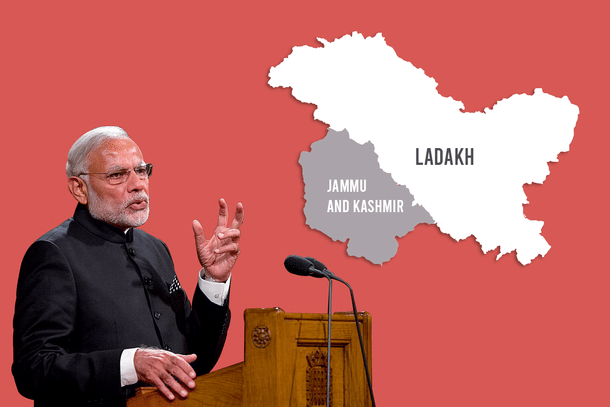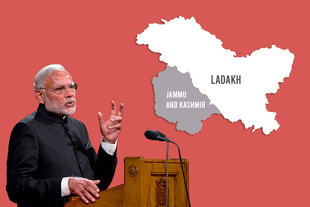Politics
Modi Government Fully Vindicated By SC Verdict Upholding Article 370 Abrogation
R Jagannathan
Dec 11, 2023, 01:39 PM | Updated 01:39 PM IST
Save & read from anywhere!
Bookmark stories for easy access on any device or the Swarajya app.


The verdict of the five-judge constitution bench headed by Chief Justice D Y Chandrachud almost fully endorses the reasons and validity of the Narendra Modi government’s actions of 5 August 2019 nullifying article 370 of the Constitution, which gave Jammu and Kashmir a separate status.
The nullification, which was done on the recommendations of the Governor after the BJP-PDP (Bharatiya Janata Party-Peoples Democratic Party) coalition collapsed and the state assembly was dissolved, has been upheld since the article was only temporary and transitional in nature.
The verdict, which was read out by the Chief Justice today (11 December), also upheld the bifurcation of the state into two Union Territories, with one crucial caveat.
While the separation of Ladakh as a Union Territory need not be reversed, the bench said that it would like the rest of J&K to revert back to statehood, preferably by holding elections to the state assembly by September 2024. The deadline may, however, not be cast in stone.
This is a huge, huge victory not only for the Modi government, but for commonsense. While the BJP has always maintained that the country cannot be governed by two sets of constitutions, and that J&K had to become a regular state some time or the other, no major opposition party, probably with an eye on the Muslim vote, could bring itself to state the obvious.
In the process of clinging to article 370, many of the beneficial provisions of the Indian Constitution were denied to the people of the state, including refugees, Dalits and women.
The court had the following observations to make (these conclusions have been paraphrased by me, and may not be the exact words used in the judgement).
It said that J&K ceased to have sovereignty as soon as the Maharaja of the state, Hari Singh, signed the instrument of accession to join the Indian Union. The fact that a state-level constitutional assembly was set up to frame J&K’s relationship with the Centre did not amount to giving the state the right to follow only its constitution.
The ultimate goal was to integrate, not disintegrate the country. The bench noted that the transitional arrangement was necessitated by the backdrop of war at that time, and not meant to be a permanent feature of separation between Kashmir and the rest of India.
The court refused to entertain the question of whether President’s rule was the right thing to do in 2018, when the BJP withdrew support from the PDP-led ministry and the government fell. The court said the executive needs some degree of freedom to judge which situations warranted President’ rule, even though the power of judicial review of its actions remained.
The court also said that there was nothing mala fide in the Centre’s actions, especially since the basic idea was to extend the full provisions of the Constitution to J&K, and not only the provisions the executive agreed with.
The Supreme Court bench needs to be complimented for making one thing crystal clear: no state, no matter what the circumstances under which it integrated with India, can now resist integration even if special provisions were, or are, being made for it. They have no right to secede, or hold on to secessionist ideas, except when they think injustice is being meted out under the Constitution.
But here is the thing: the J&K constitution was itself discriminatory to Indians, Dalits, women, and refugees who settled there after the Pakistani invasion of Kashmir in 1947-48. The judgement implies that the provisions now created to give seats to residents of Pakistan-occupied Kashmir (PoK) in the next assembly will get similar protection.
India has won, Bharat has succeeded in regaining its civilisational heritage in Kashmir.
Now, one hopes that similar things happen to the Citizenship Amendment Act, which deserves to be upheld for more or less the same reasons.
Jagannathan is former Editorial Director, Swarajya. He tweets at @TheJaggi.





